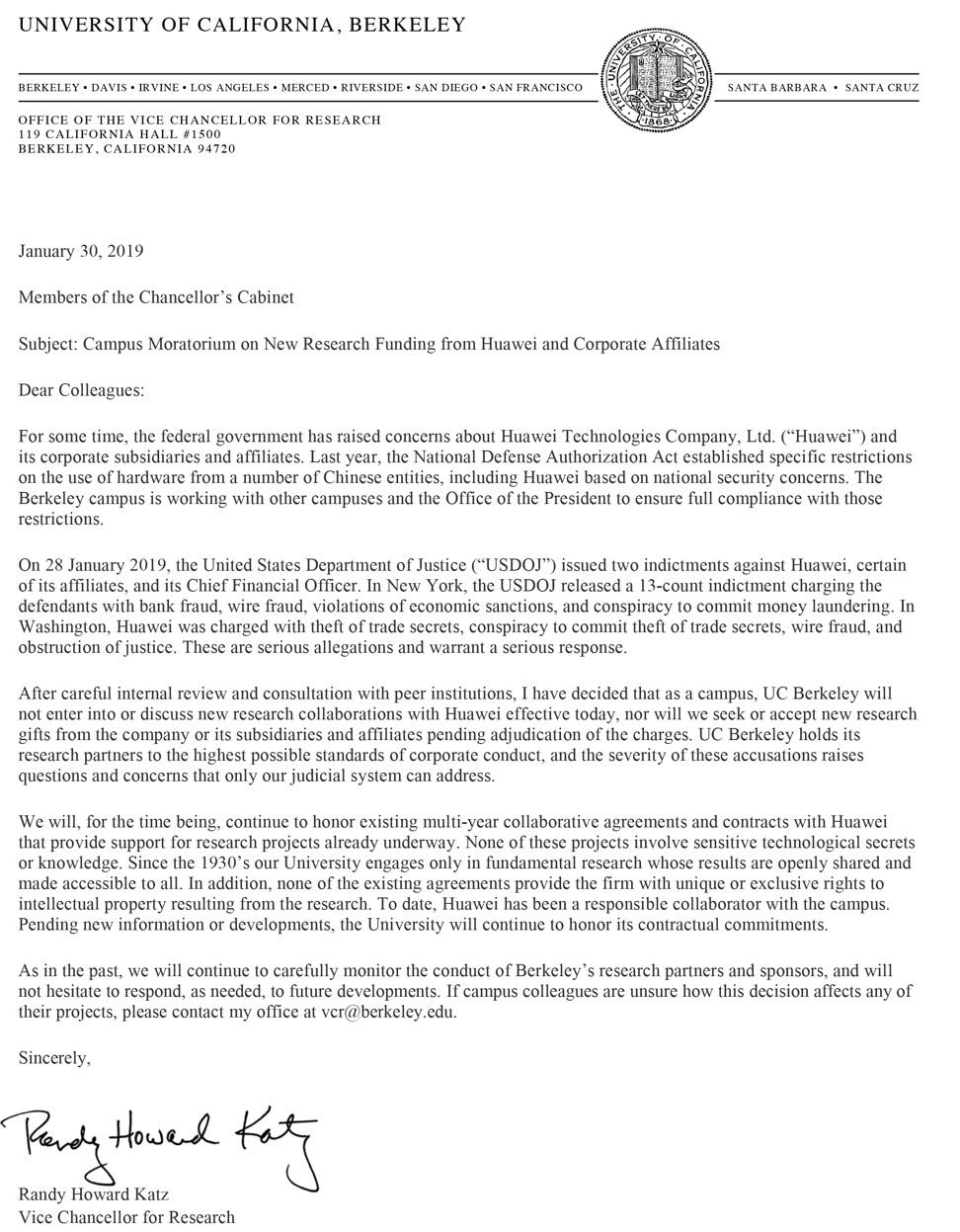
University of California Berkeley bans new research projects with Huawei after US indicts Chinese telecoms giant
- The directive halting new Huawei funding took effect on January 30, two days after the US filed criminal charges against the telecoms equipment maker
- The ban does not apply to existing multi-year collaborative deals because ‘none of these projects involve sensitive technological secrets,’ the school said
The University of California’s flagship campus in Berkeley, one of the world’s top academic institutions, has halted new research collaborations with China’s Huawei Technologies in the wake of sweeping US criminal indictments against the telecoms equipment giant.
The directive banning new funding or gifts by Huawei or any of its subsidiaries and affiliates in support of UC Berkeley research projects took effect on January 30 “after careful internal review and consultation with peer institutions” because of the “serious allegations” in the US Justice Department’s 13-count indictment announced two days earlier, the university said.

“UC Berkeley holds its research partners to the highest possible standards of corporate conduct, and the severity of these accusations raises questions and concerns that only our judicial system can address,” Randy Howard Katz, the university’s vice-chancellor for research, said in a letter to the school’s deans and other senior directors.
The US justice department’s indictments contend that Huawei stole trade secrets from a telecoms rival and violated US sanctions against doing business with Iran.
The charges were brought against Huawei, China’s largest smartphone maker; its US affiliate; Hong Kong-based Skycom; and Sabrina Meng Wanzhou, Huawei’s chief financial officer, for conspiracy that poses a national security threat to the US.
Oxford says two Huawei projects will continue but new grants suspended
Meng, 46, a daughter of Huawei’s founder, is accused of committing bank fraud to sidestep sanctions against doing business with Iran. She is free on bail in Vancouver, Canada, pending extradition proceedings.
UC Berkeley’s break with Huawei follows a similar move by Oxford University, which suspended all new research grants and donations the company last month.
The California university, which is the world’s fourth best according to US News & World Report rankings, recently removed a Huawei videoconferencing system to conform with restrictions established by the US National Defence Authorisation Act.
A provision of the act, which was signed into law by US President Donald Trump in August, bans recipients of federal funding from using telecommunications equipment, video recording services and networking components made by Huawei or ZTE.
The UC Berkeley directive lists 37 subsidiaries and affiliates of Huawei, including Skycom Tech, the Hong Kong company at the centre of Huawei’s alleged violation of US sanctions on Iran, Toga Networks, Proven Honour Capital and FutureWei Technologies.
FBI ‘ran sting against Huawei in new technology theft case’
The ban will not apply to existing multi-year collaborative agreements and contracts with Huawei that support research projects already under way because “none of these projects involve sensitive technological secrets”, according to the directive.
Those collaborations include a program called Berkeley Artificial Intelligence Research, or BAIR, which is supported by Facebook, Microsoft, Samsung, Nokia and 15 other global companies including Huawei.
The BAIR programme brings together UC Berkeley faculty and graduate students pursuing research in the areas of computer vision, machine learning, natural language processing, planning and robotics.
Over the past two years, funding provided by Huawei and its affiliates totalled US$7.8 million, Dan Mogulof, assistant vice-chancellor in the school’s office of communications and public affairs, said in an emailed response to questions. Berkeley’s total research funding in the same period was about US$1.3 billion.
“Since the 1930s this university’s policy makes clear that we will not engage in any research whose results cannot be openly and publicly published,” he said.
“The only exception to that would be classified (and therefore highly restricted) national security work done in concert with the US government,” he said. “That is the nature of ‘fundamental research’.”
Other US universities may be coming under increased pressure to cut ties with Huawei.
The US Department of Education started a new initiative directed specifically at the company last year, according to a person familiar with the matter.
Education Secretary Betsy DeVos “is known to have requested that several American research universities inquire into how many of their faculty have received donations from Huawei and under what conditions”, the source told the Post in December.
US steps up reviews of Chinese research activity on American campuses
Huawei has made no secret of its efforts to collaborate with researchers in the US. The company promotes its Huawei Innovation Research Programme (HIRP) as a global initiative “to identify and support world-class, full-time faculty members pursuing innovation of mutual interest”, according to a programme website.
In one Huawei presentation available online, Stanford, Harvard, Yale and the University of California Los Angeles are named as HIRP collaborators.
None of those universities responded to queries seeking comment about whether their faculty members are collaborating with Huawei.


